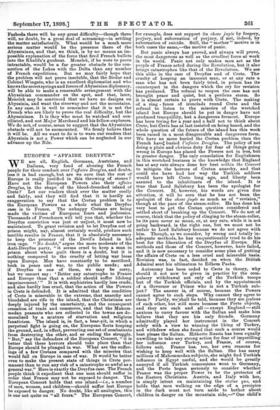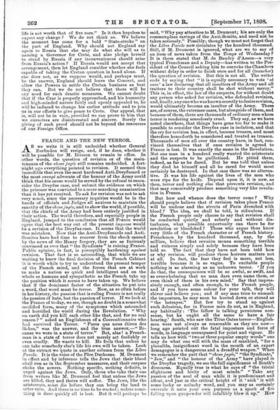EUROPE'S " AFFAIRE DREYFUS."
WE are all, English, Germans, Austrians, and Italians, very fond of abusing the French people for their conduct over l'affaire Dreyfus, and doubt- less it is bad enough, but are we sure that the rest of Europe is really justified in this throwing of stones ? Have not the European Powers also their affaire Dreyfus, in the shape of the blood-drenched island of Crete ? Let our readers think over the matter coolly and fairly, and they will find that it is hardly an exaggeration to say that the Cretan problem is to the European Powers as a whole what the Dreyfus case is to France. The unhappy Cretans are being made the victims of European fears and jealousies. Thousands of Frenchmen will tell you that, whether the Dreyfus conviction was just or unjust, it must now be maintained. To grant revision and to let Dreyfus out of prison might, nay, almost certainly would, produce such terrible results in France, that it is absolutely necessary to keep the prisoner of the Devil's Island in his iron cage. "No doubt," argue the more moderate of the Anti-Dreyfus party, "it seems cruel to keep a man in prison about whose guilt there is -a doubt, but it is nothing compared to the cruelty of letting -war loose upon Europe. Men have constantly to be sacrificed, both in peace and war, to the public needs ; and if Dreyfus is one of them, we may be sorry, but we cannot say : Better any catastrophe to France and Europe than that a soldier should suffer lifelong imprisonment.' " It is with sophistries hardly less crude, and also hardly less cruel, that the action of the Powers in Crete is defended. It is admitted that the condition of Crete is miserable in the extreme, that anarchy and bloodshed are rife in the island, that the Christians are deeply injured by the uncertainty, and the consequent cessation of trade and commerce, and that the Mahom- medan peasants who are collected in the towns are de- moralised by a mixture of starvation and religious fanaticism. The island is, in fact, a bear-pit, in which a perpetual fight is going on, the European fleets keeping the ground, and, in effect, preventing one set of combatants from destroying the other, and so ending the struggle. "But," say the defenders of the European Concert, "it is better that these horrors should take place than that Europe should be plunged in war. What are the suffer- ings of a few Cretans compared with the miseries that would fall on Europe in case of war. It would be better even to make the present state of things in Crete per- manent than to run any risk of a catastrophe so awful as a general war." Here is exactly the Dreyfus case. The French people think it expedient that one man should suffer in order that France may not be exposed to danger. The European Concert holds that one island—i.e., a number of men, women, and children—should suffer lest Europe be exposed to danger. No doubt, like all analogies, this is one not quite on "all fours," The European Concert, for example, does not support its chose jugee by forgery, perjury, and subornation of perjury, if not, indeed, by subornation of suicide. Still, the " mother " motive is in both cases the same,—the motive of panic.
But panic always has proved, and always will prove, the most dangerous as well as the cruellest force at work in the world. Panic not only makes men act as the people of France acted during the Revolution, but it also brings catastrophes like that of the Revolution. We see this alike in the case of Dreyfus and of Crete. The cruelty of keeping an innocent man, or at any rate a man who has not been fairly tried, in prison has its counterpart in the dangers which the cry for revision has produced. The refusal to reopen the ease has not brought peace and quiet, but a perilous storm. So it is almost certain to prove with Crete. The making of a ring - fence of ironclads round Crete and the refusal to listen to the miseries of the wretched island lest Europe should be put in danger have not produced tranquillity, but a dangerous ferment. Europe has been trying for a year and a half not to think about Crete, but Crete has at last insisted on being heard, and the whole question of the future of the island has this week been raised in a most disagreeable and dangerous form. We have no more buried the Cretan problem than the French have: buried l'aficaire Dreyfus. The policy of not doing a plain and obvious duty for fear of things going wrong in Europe has placed the Powers not in less, but in greater danger. The only consolation for Englishmen in this wretched business is the knowledge that England has at any rate always done her best within the Concert to mitigate the horrors of Cretan anarchy, and that could she have had her way the Turkish soldiers would have left Crete long ago, and liberty been assured to the inhabitants of the island. It is true that Lord Salisbury has been the apologist for the Concert. If, however, his words are given due attention, it will be seen that he has not been the apologist of the chose juge'e so much as of "revision," though at the pace of the steam-roller. He has done his very best to get the Cretan question considered and 3ettled short of breaking up the Concert. We do not of course, think that the policy of clinging to the steam-roller, be its pace never so mean, or, at any rate, while it is not going backward, is the right one, but we must not be unfair to Lord Salisbury because we do not agree with him. Though, as we consider, by wrong and totally in- adequate methods, he has unquestionably tried to do his best for the liberation of the Dreyfus of Europe. His methods and those of the Concert, however, have failed, and it is now necessary to consider some plan of putting the affairs of Crete on a less cruel and miserable basis. Revision was, in fact, decided on when the British Admiral sent his ultimatum to Edhem Pasha.
Autonomy has been ceded to Crete in theory, why should it not now be given in practice by the com- pulsory withdrawal not only of the Turkish troops but of the Turkish officials, and by the appointment of a Governor or Prince who is not a Turkish sub- ject? The answer is, of course, because the Powers cannot agree to such steps. Why cannot they agree to them ? Partly, we:shall be told, because they are jealous of each other, but still more because the Porte objects, and they are each and all — except England— still anxious to curry favour with the Sultan and make him believe that they are his only friends. Germany admittedly played her instrument in the Concert solely with a view to winning the liking of Turkey, and withdrew when she found that such a course would best please the Sultan. Hitherto Russia has been equally unwilling to take any strong action for fear of imperilling her influence over Turkey, and France, of course, follows suit. France has, too, her own reasons for wishing to keep well with the Sultan. She has many millions of Mahommedan subjects, she might find Turkish influence in Egypt useful, and she would be greatly annoyed if all Turkish concessions went to Germany, and the Porte began seriously to consider whether France was the proper Power to be the protector of the Eastern Christians. Austria, and Italy with her, is simply intent on maintaining the status quo, and holds that men walking on the edge of a precipice in the dark must not turn aside to bother about children in danger on the mountain side,—" One child's life is not worth that of five men." Is it then hopeless to expect any change ? We do not think so. We believe the moment has come for a bold " State-stroke " on the part of England. Why should not England say again to Russia that she may do what she will as to naming a Governor for Crete, and also pledge herself -to stand by Russia if any inconveniences should arise from Russia's action ? If Russia would not accept that arrangement, then let England consider whether she feels capable of taking the Cretan question in hand alone. If she does not, as we suppose would, and perhaps must, be the answer, England should leave the Concert, and allow the Powers to settle the Cretan business as best they can. But we do not believe that there will be • any need for such drastic measures. We cannot doubt that if the Czar is properly approached, and his humanity and high-minded nature fairly and openly appealed to, he will be induced to change his earlier attitude and to join us in our efforts to give peace to Crete. Our appeal, that is, will not be in vain, provided we can prove to him that we ourselves are disinterested and sincere. Surely the giving of such proof should not be beyond the resources -of our Foreign Office.



































 Previous page
Previous page